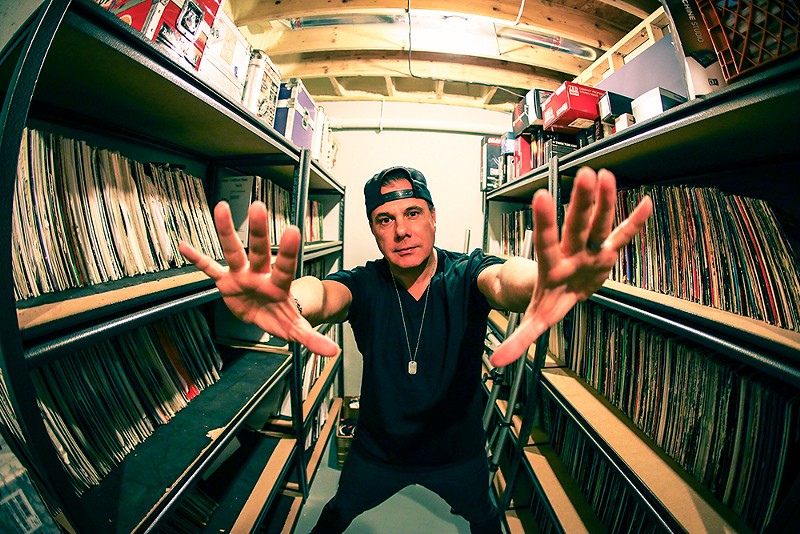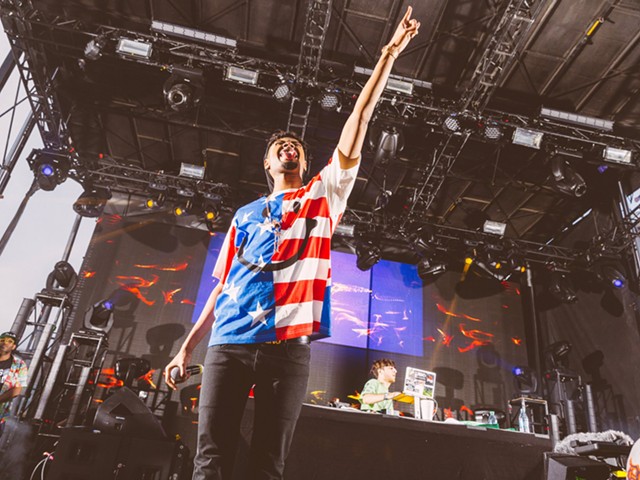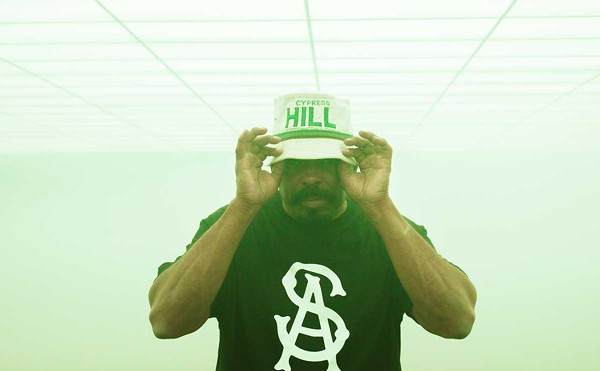DJ Godfather on his first(ish) solo record, Detroit's ghettotech scene, and that ‘Godzilla’ sample
[
{
"name": "GPT - Leaderboard - Inline - Content",
"component": "35519556",
"insertPoint": "5th",
"startingPoint": "3",
"requiredCountToDisplay": "3",
"maxInsertions": 100
}
]
In the Christian tradition, the sacred duty of being a godfather is one of the markers of adulthood and recognition among the community. To take on the title means that one is taking on responsibility, both literally and figuratively. In the case of Detroit’s DJ Godfather, the name suits him.
DJ Godfather (aka Brian Jeffries) launched his career in his early teens and today is one of the godfathers of the Detroit ghettotech scene. Metro Times caught up with DJ Godfather to talk about his latest release (Electro Beats for Freaks, out now), as well as quarantine, Godzilla, and more.
This interview has been edited for length and clarity.
Metro Times: After such a long career, what made you decide that now was the time to release this full-length album?
DJ Godfather: Well, there’s a little confusion because I actually released an album before, but that was so long ago we actually kind of forgot about it. With this kind of music, a lot of people, they'll hear the tracks, or another DJ play the tracks, but the average listener, they don't know where a lot of the tracks [came from], like who the original artist is or anything like that. And so I've released tons of EPs, mainly just for DJs. But I kind of wanted to do a massive project that you could just pop in and play for a long time, and there's a lot of variety on it, and something that no one else is doing right now. Because I had almost 100 tracks done, I was like, I’m going to pick out like half of these tracks and do something just massive that you could just play for an hour or two. I'm very fast in the studio, so I could do a track or two a day completed beginning to end.
MT: What was the process like, returning to the studio to record this mammoth release?
DJ Godfather: Well, I never stopped in the studio. It's not like I stepped away from the studio for years or anything like that. For me, the studio is like my zen, and you know, it's my hobby. I'm blessed to make money from my hobby, because making tracks and my record label was literally my living for a long time. And now that I'm more into nightclubs (owner of the Annex and 3Fifty Terrace) and different things like that where I make a better living now, I was able to get back to a place to where just making tracks is super fun, and it turned back to passion again instead of just business, which is good because you know when you're super passionate about everything, other rewards come. It's just a better place I'm in right now.
MT: Listening to the record feels like listening to a well-rounded DJ set.
DJ Godfather: When you hear a producer make music, most of the time you can tell it's them right away and it's their style. I tried to give every track its own kind of attitude. I didn't want the tracks all sounding the same one after the other, you know, trying to use different sounds and different drum patterns and melodies. Some tracks have vocals, some don't. I tried to make it so almost every other track had vocals, and it kind of gave it a breather. I mean it's kind of like how I DJ. When I do a ghettotech set, I like to see like the vocal tracks in between more than instrumental tracks. It's kind of a good formula for me, so I decided to produce an album that way.
MT: In your own words, what exactly is ghettotech, and how did it come to exist, and how did you find yourself in that world?
DJ Godfather: In the late ’80s, techno music was born from Detroit, and in the late ’80s and early ’90s, Miami bass, booty music, came out — like 2 Live Crew and stuff like that. Around that time I was 15, and that’s when I started DJing in this place called Jams that used to be at Four Bears Waterpark in Shelby Township. And so I started playing there when it was probably six, seven months after I got my turntables. It was, like, my first gig, and it was crazy because it was a teen club. So I'm playing for 800 people my own age, you know, so it's really cool. It was a really good place for me to start because I wasn't intimidated by playing for all these older people. A lot of the kids liked a lot of that techno music that was coming out, but you couldn't play like a half hour of it or an hour of it, you know, because of their attention span. So what we used to do is we would play a techno record and then mix it with a Miami bass record, because then that would have words, and it was kind of it's a little bit more brighter music and a little bit more booty-shakin’ for the girls. So we would play, like, a techno record, and a Miami bass record, and a techno record, and another Miami bass record — kind of like the formula for my album. So next thing you know, when you hear these sounds mixed over each other, it kind of created a different attitude in the music. About a year later is when I learned how to start producing tracks, so I just started taking the little sounds and elements out of a techno record and the sounds and elements out of a Miami bass booty record, and I kind of fused them together. Like I took the words from this, and the drums from this, and I like these dark synth sounds from from this, and I would just take and try and produce my own tracks that way. There's a handful of other people that started producing records that all kind of had the same feel, and next thing you know this kind of genre exploded. For years, it didn't even have a name. Finally it got to the point where we started pressing vinyl records, and other distributors from overseas in Europe were buying this stuff. Then it got to the point where we started doing interviews with international magazines and there was still no name for this genre music. A guy named Hobey Echlin — he’s from the Detroit area; he was writing for like Rolling Stone and Spin — he finally just kind of gave it a name, “ghettotech.” (Note: Echlin was a Metro Times contributor.)
MT: It was such a period of growth for not only Detroit's music scene, but Detroit artists were getting international press, as well.
DJ Godfather: It's just crazy because, you know, at first our mindset was just making music for Detroit. Detroit supported this music so much, not only between people buying mixtapes and CDs, but just the vinyl stores alone. You could have a good ghettotech record on vinyl, and you would sell 1,000 copies just in the city of Detroit alone out of six different record stores. At that time you needed to press around 350 copies to break even, so we would press 1,000 records, make money, and then repress them more if we sold out. Not to mention the mix CDs alone — I mean, they were selling by the thousands. We didn't even think about trying to market this stuff outside of Detroit, and then all of a sudden different distributors started catching on, and it just got bigger and bigger. Now it's to the point where there's more people that make this music outside of Detroit than there is inside of Detroit now.
MT: Your single “Godzilla 2020” was added as the top track to Spotify’s “Electro Machine Funk” playlist. Can you tell us about that?
DJ Godfather: That’s the original “Godzilla” track that we put out and did really well in Detroit. I actually didn't make the original song. Another artist (DJ Slugo) made it, and my label (Databass) signed it (in 2003). The crazy thing with that record is that it actually sampled the theme music from the actual movie Godzilla. Technically, we never owned the rights. We never cleared the sample, and a big company like that wants thousands of dollars — like 50, 60, 70 grand — and you're not going to make that off the record. So we just kind of released it underground, but we couldn't do anything with the record. So I did a remix to the “Godzilla” track like years ago, and the remix record that we did outsold the original. Then me and the original artist parted ways, and he took his original and I took my remixes, but at the end of the day it didn't matter because the sample was never cleared.
So what I did with “Godzilla 2020” is we re-created the sample — we replayed the horn sections that we sampled, so now there's no sample to clear. I learned my lesson off that record, because Honda actually approached us years ago to use the “Godzilla” track for a commercial for the Honda Fit. They offered us like 50, 60 grand just to use the song in their commercial, but then we told them how we never cleared it. So they went to Toho, the people that owned the original Godzilla sample, and offered them something like 30, 40 grand just to clear the sample, and they turned it down.
We tried reaching out to Toho saying, look it, you know, we'll give you half of our money too, so you'll make more for the sample. They literally said “No, stop messaging us, we don't want our song commercialized.” … My point is, even with all that money, they still wouldn't clear the sample. So I kind of just replayed it. At first I just redid it for the fun of it. I'm like, you know what, I'll just put it on the album, you know, because people remember the “Godzilla” track and I’ll throw it on an album — I literally just did it for the fun of it. I didn't really have any intention with it at first.
The crazy thing is that Big Sean sampled our “Godzilla” track for his latest album, Detroit 2. He did a song called “The Baddest.” And his manager hit me up to clear the sample from me. So I had to tell him that whole story I just told you, and I was trying to tell him, “Look, you could sample my version, because I know you and I'll clear it for you, but Toho owns the original Godzilla track, and they turned down a total of 80 grand.” So Jay Z’s attorneys got involved, and they wound up clearing the sample for six figures for Big Sean’s album. So they made it work, but it's just crazy. It taught me a lesson — I just know not to sample things, because if you sample things you'll never be in complete control of your song. You'll have to seek permission and you'll have to pay people, so it's just best not to sample anymore. I think most of the hip-hop guys aren't sampling anymore. In the ’80s and ’90s and with all the Miami bass records, all that stuff with samples — that was just the culture.
MT: How have you been keeping busy during the pandemic?
DJ Godfather: At first I would just mess around because when quarantine really hit, we're all like, what do we do with ourselves? So I started doing livestreams just to mess around. To me, most of these streams, watching DJs and stuff, it's — no offense to any DJs — but it's just boring to me. Like every other post on Facebook was someone's livestream, and I'm like, OK, I don't want to look at your messy bedroom with your turntables and clothes on your bed while you're DJing. So I started doing streams from my studio, and I incorporated a lot of turntableism, a lot of scratching, and juggling, and a lot of tricks on turntables that most DJs don't do. Most DJs just play music, and there's nothing wrong with that, you know. I started out as a battle DJ, so I always incorporate my turntable tricks with my DJ sets. In my opinion, when you're doing that you're giving people something to watch, as opposed to just listening and watching a DJ stand behind the turntables, or CDJs, or whatever they're using. So I really tried to say, OK, if these people are going to watch me, then I'm going to give them a show. I'm going to show off. I was doing them every Wednesday, and it was just crazy, because with no promotion, no marketing or anything, I mean, they were getting tons of views and impressions, they're getting 3,000 comments while I was playing. People were just talking like it was literally like a house party in the thread. People were like, “I remember this track,” “I love this track.” People were interacting with each other. After the first couple I was getting bored, but then my wife was like, “Look how many people are happy watching you, people are saying how you’re making their week right now.” And so I continued to do it for a while. It was literally for them at that point and not even for me, you know, because it's very hard for a DJ to get into it when you're standing in a room by yourself.
MT: What else has been keeping you busy during quarantine?
DJ Godfather: I have almost 100 tracks done, so I have enough for another album already. And I'm still working on stuff. I've been buying a lot of new toys for my studio. When you buy toys, when you buy different gear for your studio, it kind of makes you make the tracks different and then when you make the tracks different, different ideas come out. It's always good to have new synths and drum machines, because when you have a new piece of gear and get your hands on it, you're thinking differently.
Electro Beats for Freaks is out now.
We have a new events newsletter! Find out the best things to do in the area every Thursday in your inbox.






